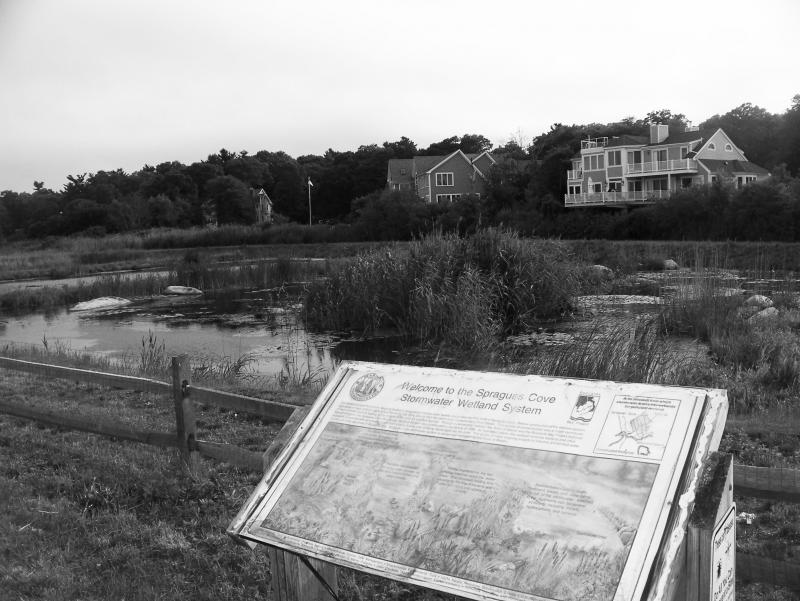Commission, residents spar over who controls Sprague's Cove
Near Silvershell Beach, a small cove is causing a big controversy.
Depending on whom you ask, when phragmites were cleared from Sprague’s Cove in 2012 that action either destroyed wildlife habitat or stopped the invasive species from spreading.
To prevent another clearing, a group of residents has called on Selectmen to put the cove under the management of a subcommittee overseen by the Open Space Acquisition Committee.
“Allowing the invasive vegetation to repopulate Sprague’s Cove is not in the best interest of the town, its residents, the stormwater remediation function or the native wildlife,” said Conservation Commission Vice Chair Norm Hill.
Hill said his commission was tasked with overseeing the cove shortly after it was built, and it should stay that way.
The cove is a 64-acre catch basin designed to remove pollution from stormwater before it’s reaches the harbor. Built in 1995, the basin was a joint venture between Marion and the Buzzards Bay Project National Estuary Program.
At Town Meeting in May, commission members asked for funds to pay for more phragmites maintenance at the cove. Annie Rockwell, one of the people involved in the cove’s construction, spoke out against the motion. Voters agreed and shot down the request.
Last month, Rockwell launched a petition to put the cove under new management.
“It was horrible,” Rockwell said about the 2012 cutting. “That destroyed a beautiful area that was home to otters, turtles and heron.”
Hills said after years of neglecting the site, the Conservation Commission acted appropriately.
“The phragmites invasion occurred because the Conservation Commission did not exercise its responsibility to maintain control of the vegetation at Sprague’s Cove, to aggressively attack the invasive species when it first showed up.”
In 2007, commission members started to inspect the area alongside the Department of Public Works.
“That was too late,” Hills said. “The density of the unwanted vegetation increased to the point that it was almost impenetrable.”
The fast growing plants offer little benefit to wildlife and in many cases out-compete native plants, he said.
“Although phragmites provide habitat for some wildlife species, the changes in plant structure, in biodiversity and in wildlife food production reduce the habitat value,” Hills said.
Selectmen currently are in charge of the basin. Previously, the Recreation Committee managed the area, but that board no longer has any members.
To solve the issue, Town Administrator Paul Dawson asked members of the Conservation Commission and the Open Space Commission for proposals. The commission members are charged with explaining why their respective board should oversee the cove.
According to Hills, the Conservation Commission earned that role shortly after Sprague’s Cove was built.
In a planning document drafted by three organizations involved with the cove, it is written that, “Both long- and short-term inspection and maintenance of the system is the primary responsibility of the Marion Conservation Commission. Any noxious vegetation that threatens the plant diversity within the wetlands must be controlled.”
The Soil Conservation Service, the Plymouth County Conservation District and the Buzzards Bay Project prepared the document in 1992 to outline the cove’s operations.
Hills said the commission is still under that mandate.
In another document, “The Final Report Sprague’s Cove/Front Street Stormwater Remediation Project,” mentions that phragmites, “If left uncontrolled, will out-compete the existing wetland species.”
An electronic copy of the full report can be read on the front page of Marion’s town website, www.marionma.gov.
Hills admitted that the commission had ignored the phragmites at the cove for years.
When the commission inspected the site in 2007 aggressive action was needed.
“That was too late,” he said. “The density of the unwanted vegetation increased to the point that it was almost impenetrable."
Hills said phragmites pose a number of issues, including loss of habitat for native plants and animals and inhibiting mosquito control measures.
Looking back to 2012, Hills said the public should have been consulted before the cuts took place.
“In hindsight that was a bad decision,” he said.
But looking ahead, he said it’s vital that the Conservation Commission be in charge of the cove. Regular maintenance keeps the plants in check, he said.
“Invasive species can be controlled. A walk around Sprague’s Cove will confirm the success of the action to date, but control requires continued effort.”
















